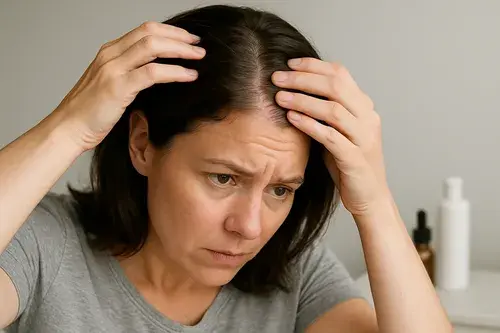Understanding Scalp Conditions That Lead to Hair Loss
Explore common scalp conditions like psoriasis, fungal infections, and autoimmune disorders that cause hair loss.

Hair loss can be a distressing condition, often stemming from various scalp issues. While some causes are well-known, such as hereditary conditions and hormonal imbalances, others are less understood but equally impactful. This article delves into the common scalp conditions that lead to hair loss, focusing on psoriasis and its effects. Hereditary Conditions One of the most common causes of hair loss is androgenic alopecia, also known as male pattern baldness. This condition is influenced by genetics and typically becomes noticeable with aging. It affects both men and women but is more prevalent in men. The pattern of hair loss usually starts at the crown of the head and progresses towards the front of the scalp, leading to a receding hairline in men and thinning at the top of the head in women. Autoimmune Disorders Psoriasis is an autoimmune disorder that affects the skin and can also impact the scalp. It causes red, scaly patches on the skin and scalp, leading to hair loss. The exact cause of psoriasis is unknown, but it is believed to be linked to an overactive immune system. In scalp psoriasis, these patches can be particularly itchy and painful, making it difficult for individuals to manage their condition. Fungal Infections Tinea capitis, commonly known as scalp ringworm, is a fungal infection that primarily affects children. This condition causes hair to fall out in patches, often accompanied by redness and inflammation on the scalp. It is contagious and can be treated with antifungal medications. Other Scalp Conditions Folliculitis Decalvans: This inflammatory disorder leads to the destruction of hair follicles, resulting in permanent hair loss. It is characterized by redness, swelling, and lesions on the scalp that may be itchy or contain pus. Dissecting Cellulitis of the Scalp: A rare condition that causes pustules or lumps to form on the scalp, potentially leading to scar tissue formation and subsequent hair loss. Frontal Fibrosing Alopecia: Typically occurring in a receding hairline pattern, this condition also affects postmenopausal women and may result in hair loss in the eyebrows and underarms. The exact cause is unknown. Symptoms and Diagnosis Scalp conditions often present with similar symptoms, including rashes, hair loss or thinning, weak hair and breakages, itchiness, scaly patches, pain, and tenderness. Diagnosing these conditions typically involves a visual examination by a healthcare provider. For some conditions like psoriasis or lice infestations, diagnosis can be straightforward based on appearance alone. However, more complex conditions may require additional tests such as blood draws to check hormone levels or detect nutritional deficiencies. Treatment Options Treatment for scalp conditions varies depending on the underlying cause but often involves managing symptoms rather than curing the condition entirely. For psoriasis: Topical creams and ointments containing corticosteroids or vitamin D analogs can help reduce inflammation. Light therapy using ultraviolet (UV) light may also be prescribed. In severe cases, systemic medications like biologics may be necessary. For other conditions like folliculitis decalvans or dissecting cellulitis of the scalp: Antibiotics or antifungal medications may be used to control infections. Dermatologists can offer medications to control symptoms and potentially stop the progression of hair loss. Preventive Measures While some scalp conditions are unavoidable due to genetic factors or autoimmune disorders, there are steps you can take to prevent or manage them: Maintain good hygiene practices by keeping your scalp clean. Avoid tight hairstyles that can cause traction alopecia. Manage stress levels through relaxation techniques like meditation or yoga. Ensure you are getting adequate nutrition including iron and protein-rich foods. Understanding the common scalp conditions that lead to hair loss is crucial for effective management. By recognizing the symptoms and causes of these conditions—such as psoriasis—you can seek appropriate treatment and take preventive measures to maintain healthy hair growth. If you suspect you have a scalp condition affecting your hair, consult with your healthcare provider for a proper diagnosis and treatment plan.
Need Professional Consultation?
Our professional doctors will provide detailed hair and scalp analysis and develop personalized treatment plans.
Book Consultation Now